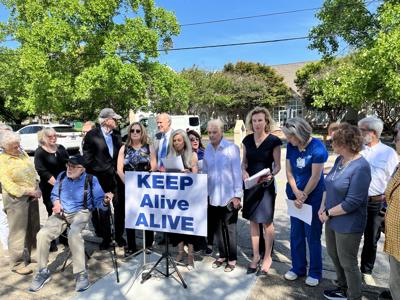This story is a partnership between the Nashville Banner and the Nashville Scene. The Banner is a nonprofit, nonpartisan news organization focused on civic news and will launch later this year. For more information, visit NashvilleBanner.com.
Update, 7:15 p.m.: Alive Hospice announced late Tuesday afternoon that the sale has been called off, with the board of directors noting that "Alive will remain a not-for-profit, independent organization."
Alive Hospice could face a sale as soon as a Wednesday meeting of the nonprofit’s board of directors.
The executive leadership and the board of directors of the half-century-old nonprofit hospice have declined to talk with the public, their own advisory board or Alive’s founders, David and Lynn Barton, about a possible sale to Amedisys, a Nashville- and Louisiana-based company that is itself in the process of being acquired. The board of Amedisys, which announced a month ago a deal to be bought by Option Care Health, said on Monday it had received an all-cash offer from a subsidiary of UnitedHealth Group.
The Banner reached out to 17 members of the Alive board on Monday to ask about the sale. All declined to comment or return calls or email requests. “I’m not in a position to speak on the matter,” said Jordan Kendig, assistant vice president for community engagement at HCA and a board member. Keri McInnis, a senior vice president at Pinnacle Bank, referred inquiries to the board’s counsel at Bass, Berry & Sims, Anna Grizzle. The Rev. Kelly Miller Smith Jr., the pastor of First Baptist Church, Capitol Hill, said he was not allowed to talk about the transaction.
A relative of one board member told the Banner, “At this time the entire board has been told they cannot speak nor write about Alive Hospice. It’s very frustrating.”
Meanwhile, public pressure continues to mount. Keep Alive Alive, a group formed in opposition to the sale, released a list of more than 100 former employees asking the board of the hospice to reconsider selling. The group includes clinical staff, executives and the previous two Alive CEOs.
A number of high-profile community members — including former U.S. Rep. Jim Cooper, Tim McGraw and Faith Hill — have come out against a possible sale, citing the quality of care their family members received from Alive.
McGraw and Hill wrote a letter on Friday to state Attorney General Jonathan Skrmetti asking him to block the sale.
“Alive is a lifeline for loved ones whose closest confidants, friends, family and acquaintances are losing theirs,” they wrote. “As Middle Tennessee’s only remaining nonprofit hospice provider, Alive has continued to serve our community’s neighbors most at risk without regard for their ability to pay and care for our loved ones through generous community-funded campaigns.”
Cooper has been particularly critical of the potential sale.
“Running hospice is hard, but needed,” said Cooper, whose wife passed away in 2021. “Running a foundation is easy by comparison. Caring for patients vs. writing checks. Alive Hospice is worth $50-100 million today. Current leadership is selling out, betraying us, for 30 pieces of silver.”
Some Alive Hospice critics have been increasingly vocal about CEO Kimberly Goessele, whose refusal to discuss a possible sale and transition into a foundation inspired a protest petition that now has more than 5,000 signatures, as well as billboards on West End.
Goessele’s work history prior to becoming CEO in 2019 is also under scrutiny, as is her nonprofit executive experience. In a 2019 announcement about her appointment, an Alive press release stated: “Goessele joins Alive from 180 Health Partners, where she served as Chief Operating Officer and led business development and strategy for the nonprofit, which provides aid to struggling women during pregnancy. Goessele also held the position of Executive Director of the 180 Impact Fund, the 501(c) arm of the organization.”
But neither are a nonprofit of any substance.
180 Health Partners was a for-profit company funded by venture capital. It was sold in 2021 to a Maryland-based digital population health company called Mindoula. The 180 Impact Fund, according to IRS records, never had revenues of more than $1,582 during the time that Goessele was its executive director.
“Ms. Goessele had a moral obligation to include the community in a decision that significantly alters Alive’s mission,” says Susan Simmons, a past Alive board chair who called for Goessele’s resignation. “But instead [she] has excluded all other voices. She has conducted these activities behind closed doors, doors that remain tightly closed to this day.”
Connor Daryani and Addison Wright contributed to this story.
Disclosure: Jim Cooper has been a donor to the Nashville Banner. He plays no part in the editorial decisions of the Banner.





